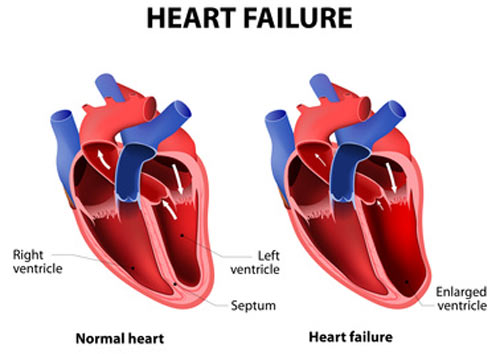What is Congestive Heart Failure?
Discover What Damage Can Congestive Heart Failure Do to Your Body

This page will explain what is congestive heart failure, what are the risk factors and symptoms, the link with sleep apnea, and how it can be treated.
The information will also help you understand how arteries become enveloped silently in inflammation and plaque, which may lead to heart failure, stroke, and heart attack.
What is Congestive Heart Failure?
Heart failure occurs if the heart cannot pump sufficient amount of blood to the rest of the body. So, when your body demand for energy, the cells, the brain, the lungs are not supplied properly because of a weakness in the heart itself.
Further more, fluid accumulates in the lungs, ankles, or legs, creating general fatigue and shortness of breath. If leg arteries are affected, you can experience fatigue or pain in the lower extremities, especially upon walking.
A good visual description of what happens in your body when you have congestive heart failure can be found in this video:
What are the causes of heart failure?
Heart failure usually occurs because of a weakness of the heart muscle. The heart then doesn't pump as strongly as it should. The most common cause of damage to the muscle is a heart attack, but it can also be due to:
- high blood pressure
- narrowing of the coronary arteries - coronary heart disease
- sleep disorders, such as sleep apnea
- narrow or leaking valves - valvular heart disease
- a problem of the heart muscle itself, where the muscle is affected directly - cardiomyopathy
- diabetes mellitus
- age - there is a dramatic increase in the incidence and prevalence of congestive heart failure with age
- excess with alcohol consumption over many years
For more info about the causes of heart failure, see other risk factors for CHF.
Is Congestive Heart Failure Dangerous?
If you don't treat your heart disease, it can be dangerous. Ten of millions of people worldwide suffer from heart failure, and the number of patients has tripled over the last few decades.
If you have a mild congestive heart failure usually you will lead a normal life, but those with more severe heart failure will be restricted in what they can do: the weaker the heart, the greater the problem.
Symptoms of Congestive Heart Failure
When your heart doesn't pump enough blood around the body, fluids builds up - edema - because there is not enough energy to push the fluid through the kidneys into your bladder.
- If the fluid builds up in your lungs, you become breathless, with a wheeze or a cough.
- If the fluid builds up around your ankles, they will swell up and you will be able to see indentations from your socks or shoes or from pressing your skin with a finger.
- some people with congestive heart failure have breathing problems at night. This happens because fluid accumulates in their lungs when they sleep.The best thing to do in that moment is to stand up, as this will take the pressure off their lungs.
For more info about other symptoms, see Symptoms of Congestive Heart Failure.
Treatment for Congestive Heart Failure
Before choosing a treatment, it is important to know the cause of heart failure, if it's mechanical, a muscle failure or a high blood pressure.
That's why you need to take some tests, like ECG, a chest X-ray, blood tests and an echo-cardiogram.
After you found out all the possible causes, your doctor can prescribe your congestive heart failure treatment.
- if your cause is mechanical, such as a leaking valve, you will need a mechanical solution - a new valve.
- if your cause is heart muscle failure, you will need medicine.
- if you have a big scar from a heart attack, which causes the muscle to stretch, it can be cut out.
- if your cause is obstructive sleep apnea, the first thing on your mind should be a CPAP.
- if you have a high blood pressure, you will need urgent treatment.
For more info about other treatments, see Treatment for Congestive Heart Failure.
The most important thing of all, is to visit your doctor as soon as you see a symptom of congestive heart failure. Don't assume that if you know what is congestive heart failure you can treat yourself at home, without needing to see a doctor.
Don't try to lose weight or do exercise just knowing that is good to your heart. Your doctor should mention what diet should you take, what tablets, and what style of life is more appropriate for you.
Sleep Apnea › Congestive Heart Failure › What is Congestive Heart Failure







